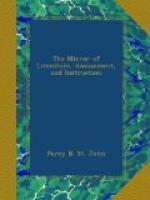The devout speaker was one of a peasant family who had entered the chapel unobserved, during my contemplation of its glittering decorations. He was apparently a Bavarian farmer, somewhat advanced in years, and wearing, in addition to his richly-substantial holiday attire, a deep green shade over his eyes, which accounted for the character of his thanksgivings to the miraculous image. “I thank thee, O most benign and saintly Maria!” had been the tenour of his prayer, “for the scattered and glorious gifts of Heaven, which had become as vain things to my soul, till thy grace renewed them in its knowledge. I thank thee for the summer skies and the green pastures—for the footsteps which no longer crave a helping hand—for the restored faces of my beloved ones—and, above all, O holiest Virgin! I glorify thy name in gratitude for the precious means by which the blessing of sight hath been again vouchsafed me!”
This last mode of expression excited my curiosity, and when the little group of votaries had concluded their ceremonies, had affixed their consecrated tapers at the shrine, and deposited their oblations with its officiating priests, I followed their joyful footsteps out of the chapel, and was again struck by the delicious transition from the heated and incense-laden atmosphere of its interior, to the pure, balmy April air without, gushing with the sweetness of the passing shower.
The ceremonies of the day were still far from their conclusion. The historical painter of Altenoetting was in attendance in the arcade, bearing the votive picture which was to perpetuate the latest miracle of the Black Lady; and as far as I could observe or ascertain of the sacerdotal hangman of the consecrated gallery, the oldest and most weather-stained of the pictures was made to yield precedence to the new comer. Having profited by a stranger’s privilege, and the English garb, which is held as sacred as a herald’s tabard in many a foreign land, to unite myself to the little group, and address some casual inquiries to its frank and overjoyous members—old Philipp Stroer himself, the hero of the day, deigned to take the picture from the hands of the sacristan, and to ciceronize for my especial edification. I trust his restored vision was not yet sufficiently acute to admit of his noting the smile which, in spite of my better will, stole over my face, as I contemplated the phenomenon of bad taste, and worse execution, which he thrust upon my observation. It represented his worthy but very unpicturesque self in the hands of an oculist, and the endurance of a cataract. The eyes of his surrounding family were fixed with eager interest upon the event of the operation. “And what,” said I, anxious to make some sympathy in this domestic crisis—“and what is the name of the surgeon whose efforts have been blessed by the protection of the Black Lady?”
“The surgeon!”
“Yes; the oculist who is represented in the picture.”




